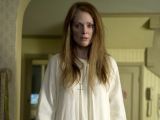Famous director Brian De Palma first brought Stephen King’s “Carrie” novel to life on the big screen in 1976 and it is, to this day, one of the best done drama / horror movies of modern cinema. So, clearly, director Kimberly Peirce (“Boys Don’t Cry”) had her work cut out for her when she agreed to helm this year’s “Carrie” remake.
Luckily, she lives up to the hype, but only on the condition you don’t go into the theater expecting her “Carrie” to be as good as De Palma’s, or looking to compare the two and point out differences (or lack thereof).
Starring Chloe Grace Moretz as Carrie White and Julianne Moore as her ultra-religious and guilt-ridden mother Margaret, this “Carrie” stands on its own, without further need of comparisons. It is tense, beautiful, and very well acted, driving the message home once more on the disastrous consequences of bullying.
High-school and teenage years in general can be very difficult for anyone, but “difficult” is an understatement where Carrie is concerned. Because her mother insisted on having her home-schooled for the biggest part of her life and because she’s unlike any other kid in school, she’s the very definition of outcast and, because of it, the perfect target for school bullies.
As any other teen who’s ever been in a position in which they’re bullied for any reason whatsoever, all that Carrie too wants is to belong: she wants to be included, to not feel different anymore. She also wants her mother to understand her, to love her unconditionally, to allow her to live a little without locking her in “her closet” to pray for imagined sins.
You see, Margaret White, played to perfection by the always exquisite Julianne Moore, had Carrie out of wedlock, a sin she could never forgive herself for. She is determined to not let her daughter make the same mistake and to save her soul from eternal damnation, whether she likes it or not.
However, Carrie’s story isn’t touching because she’s oppressed by her mother through religion, though the way in which she desperately tries to connect (only to be shut down in the most heartbreaking manner) does strike a chord. It’s touching because, watching her drama unfold onscreen, viewers find at least one thing to relate to, having experienced at least once that feeling of not-belonging and almost painfully wanting to.
In other words, religion isn’t the focus in “Carrie,” it’s mainly a means to an end. Shut out from both worlds, the outside one and her mother’s, this teen finds the only outlet available to her to be violence. “Carrie” is a drama of a bullied teen whose more or less justified rage unleashes a disaster of biblical proportions.
More importantly, it’s narrated so fluently and convincingly that, by the time all hell breaks loose, viewers are actually thrilled Carrie is finally taking revenge on the world, even if reason is clearly arguing against such action.
Moretz is only 16 years old and she’s been working in the industry for almost a decade now. She probably never went through anything even remotely similar to what Carrie experienced, but she’s such a good actress that viewers will forget that easily.
She has her own way of rendering Carrie’s “otherness” even before she discovers her telekinetic powers through physicality: she’s always trying to hide behind her long hair, hunching in the vain hope of being able to pass unnoticed, whispering and constantly looking down, even when engaged in conversation. Moretz owns Carrie, and brings to the screen her own version of the character, without a doubt.
Equally spectacular, if not actually more so, is Moore. We’ve grown accustomed to seeing her playing regular women facing daily dramas but, in this film, she stands out for the intensity and a certain feeling of muffled evil she brings to the part. Even with her telekinetic powers, Carrie is no match for Moore’s Margaret, who is ten times more terrifying – paradoxically, because she has no superhuman powers. If evil had a face, it would be Moore’s as Margaret.
Having Moore and Moretz together was truly a brilliant idea, as also was having Peirce direct the film.
“Carrie” is rated R for bloody violence, disturbing images, language, and some graphic content. It was released in US theaters on October 18, will arrive in Japan on November 7, and end its run in Italy on January 9.
The Good
Chloe Moretz and Julianne Moore are perfect together: so perfect that whenever they’re in the same frame, their interaction sends chills down the spine.
The Bad
Certain scenes are too over-the-top as far as acting goes, to the point where they can pull the viewer out of the story.

 14 DAY TRIAL //
14 DAY TRIAL // 






